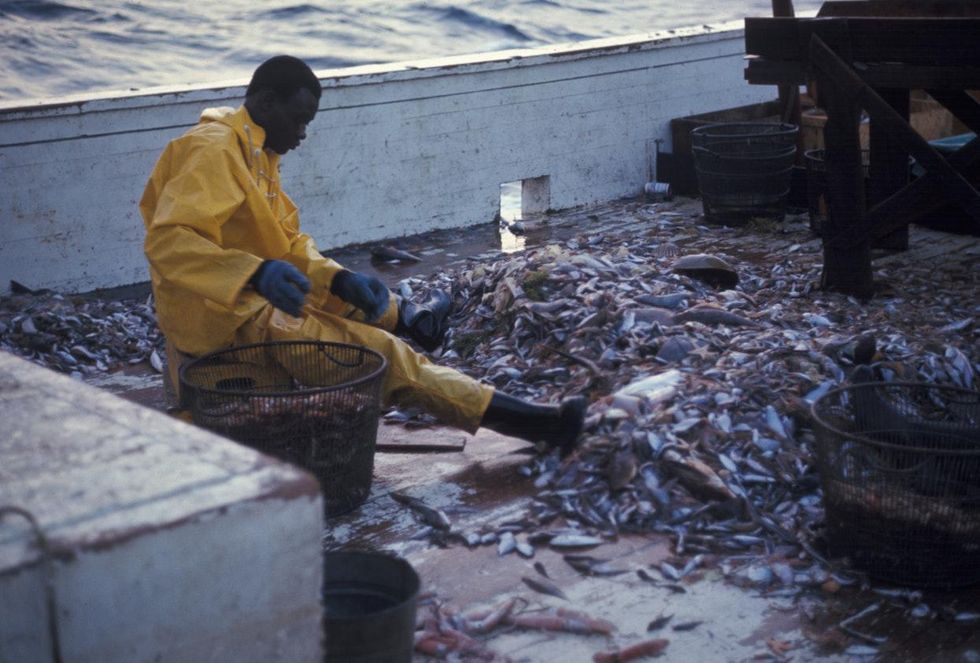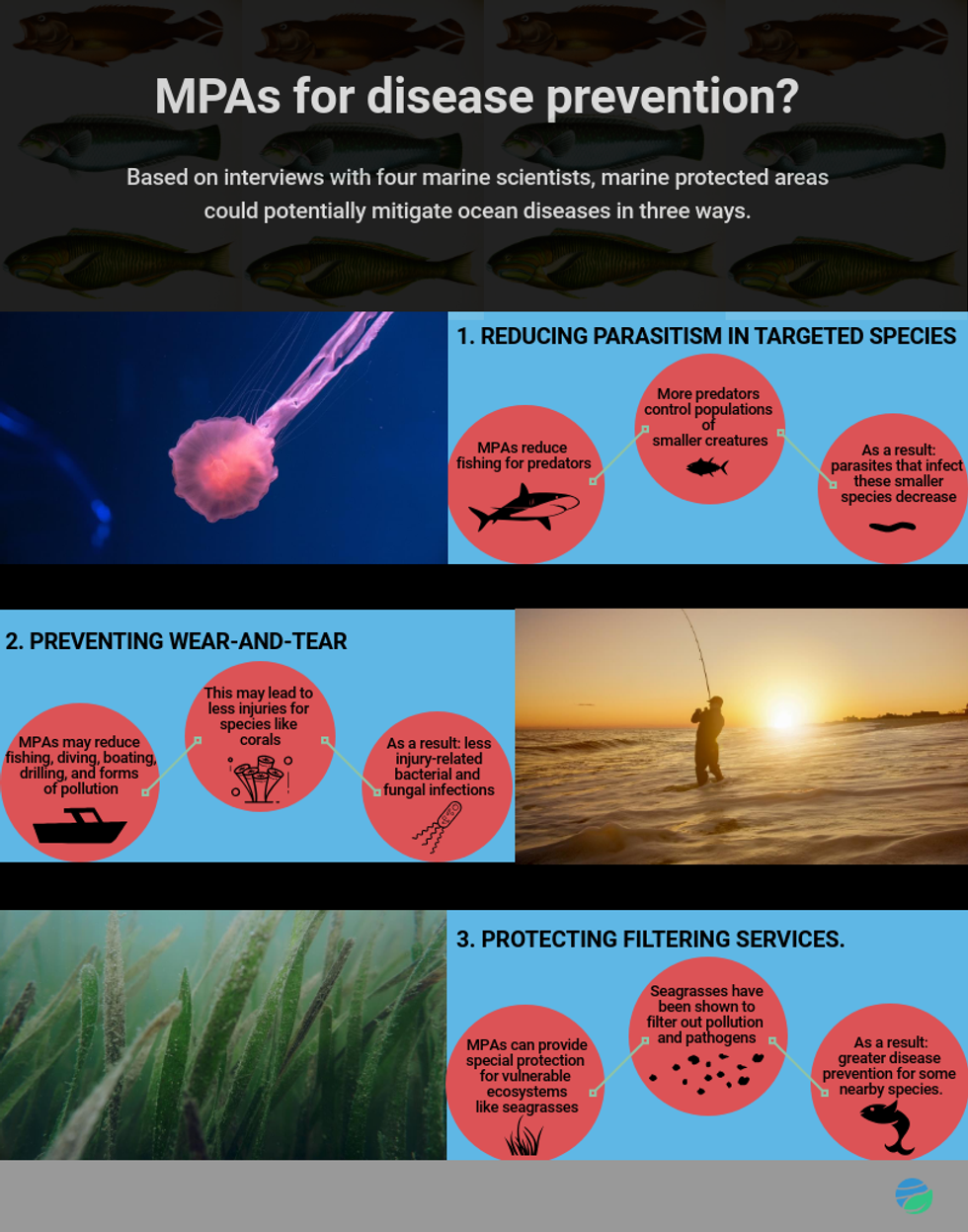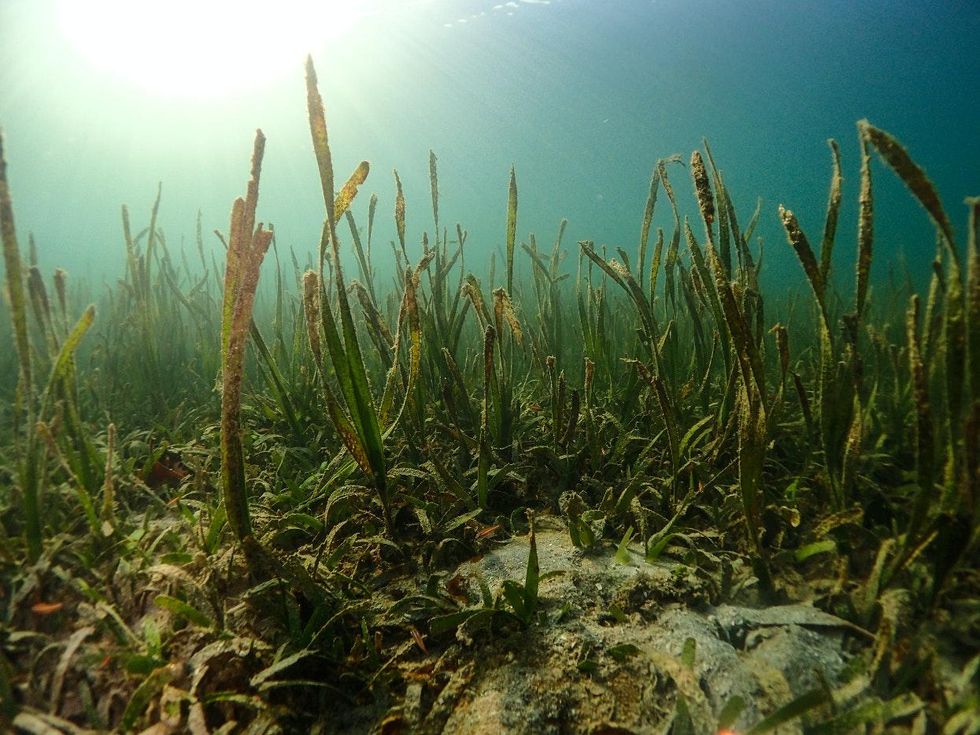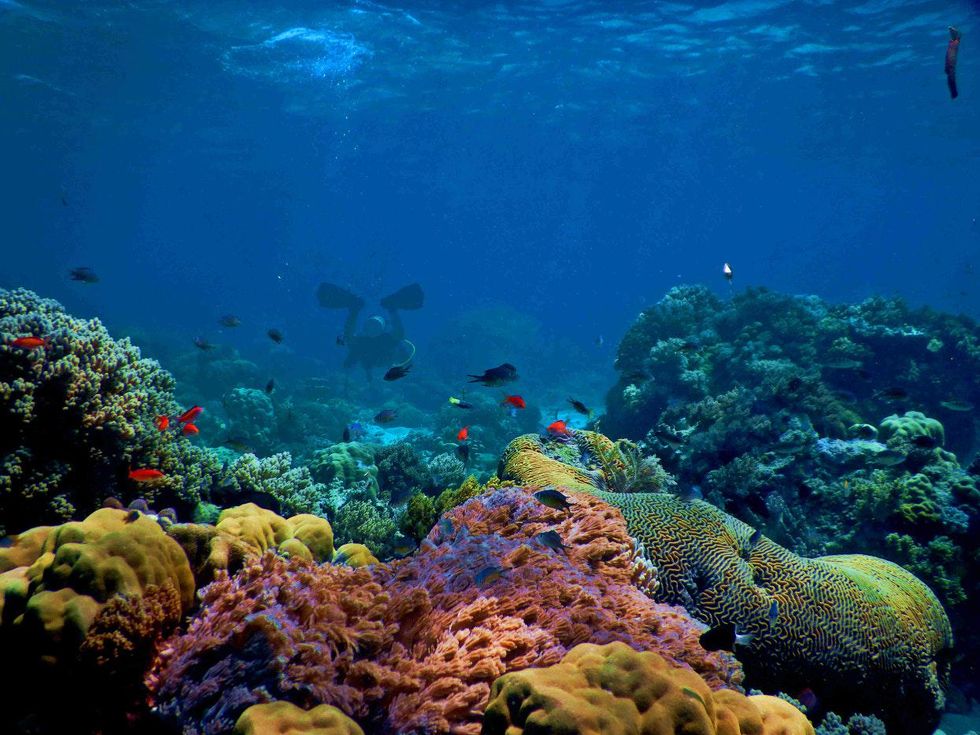
Can marine protected areas reduce marine disease?
EHN talked to marine disease experts about the role of increasing ocean protection in combating rising disease rates.
For some ocean creatures, infectious disease is growing amid a changing climate.
Marine diseases, often caused by parasites, viruses, and injuries, keep making headlines. Seastar wasting disease, shrimp white spot disease, and white plague disease in coral were some of the big ones, killing thousands of individuals needed to maintain healthy ecosystems.
For coral, shellfish, and finfish, warming temperatures are impairing immune responses during disease outbreaks. At the same time, climate change is fueling ocean acidification, precipitation changes, and greater storm damage, all drivers of marine disease.
Marine mammals—such as sea otters and seals— are also bearing the brunt of disease increase. A sixth of marine mammal species went through mass die-offs between 1955 and 2018, all due to infectious disease. Seasonal and sea temperature abnormalities linked to climate change are highly associated with marine mammal viral outbreaks, one paper out of Virginia Tech said.
"Disease is often a good sentinel for a change in the balance of nature," Drew Harvell, a professor of ecology at Cornell University, told EHN.
Related: The muddy waters of US ocean protection
Meanwhile, oceans are on the agenda for world leaders. At the 2021 One Planet Summit, 50 countries part of the High Ambition Coalition (HAC) for Nature and People, committed to protecting 30 percent of their coastal waters by 2030. Just 2.7 percent of the ocean is "highly protected," according to marine researchers. In some countries, "paper parks," which are areas identified as protected on a map but are poorly managed and offer little to no legal protection, make up 80 to 90 percent of marine protected areas (MPAs).
MPAs are government-designated marine ecosystems that are closed off from human exploitation, such as drilling, diving, and fishing. The structures of MPAs vary across the world, but overfishing is the major focus. Three billion people rely on fish as their primary protein source, while the fish stock that humans use has decreased in population by half, according to the World Wildlife Fund.
With the development of more MPAs, there will likely be shifts in the disease dynamics of marine ecosystems. The question is, will this be beneficial for species who have been ravaged by parasitism, viruses and injury infections?
EHN talked to four marine scientists, including Harvell, to reveal the various ways MPAs could benefit these vulnerable populations.
Overfishing and parasitism

Just as prohibiting fishing can reduce parasitism by allowing predation to run its course, the opposite is also true. (Credit: NOAA/Unsplash)
When fishing decreases, so do parasites that infect hosts at the bottom of the food chain.
"In MPAs you tend to see an increase in predators because those are the species that people are [fishing for] most voraciously," Chelsea Wood, an assistant professor at the University of Washington School of Aquatic and Fishery Sciences, told EHN. "Then, you can see a corresponding decline in the prey of those predators."
First, fishing is banned in an area. Then, predator numbers soar because those bigger fish that many anglers aim for are off limits. As a result, more small fish are eaten by predators, limiting the amount of hosts for certain parasites to latch onto.
For example, parasites that infect tuna could decrease in MPAs where shark-fishing is prohibited, because the apex predator will not allow tuna populations to get out of hand.
When parasites do not have hosts to infect, they cannot spread disease.
But there is a flip-side. Just as prohibiting fishing can reduce parasitism by allowing predation to run its course, the opposite is also true, Wood said.
The general rule: When a host-species multiplies, so will it's corresponding parasites.
When fishing is not allowed in an area, the parasites that infect larger, highly-sought out species will increase. Outside of Central Chile, Wood and a team of researchers found that across four marine species that are commonly fished, parasites were significantly more prevalent in protected areas.
And this is what makes it tricky. Protecting sharks will reduce tuna parasites, but there will be a spike in shark parasites.
Additionally, closing an area to fishing can have other unintended consequences, such as overcrowding caused by larger levels of biodiversity, biomass, and body sizes. Overcrowding can escalate injuries, stress, and the transmission of parasites—each an agent of disease, Charlotte Davies, a research officer at Swansea University's biosciences department in Wales, wrote in a recent paper.
"High population densities will in turn increase the prevalence and intensity of their associated pathogens," Davies told EHN.
Less wear-and-tear

Areas that prohibit human stressors can prevent wear-and-tear, alleviating the impacts of infection, said Kevin Lafferty, an ecologist at the University of California, Santa Barbara's Marine Science Institute.
Research on coral reefs by Joleah Lamb, an assistant professor of ecology and evolutionary biology at University of California, Irvine, shows MPAs slow disease through reducing abrasions from fishing, boating, and diving. Threatened coral reefs are mainly managed through MPAs, making them "an ideal model system" for evaluating if limiting human-use can minimize disease, one Lamb study said.
That study, published in Ecology, found that corals within no-take marine reserves, where fishing-related injuries are nonexistent because there are strict fishing bans, had four times less disease than those that were unprotected.
Another Lamb study found a three-fold increase in coral disease around the Koh Tao island of Thailand, in areas with high scuba diving and tourist use compared to protected areas.
"Coral diseases are higher in places where corals receive injuries, and some of the ways they get injured is through fishing gear and diving," Lafferty told EHN. "So if you keep people from fishing in coral reefs, they get fewer injuries and suffer fewer secondary bacterial and fungal infections."
In one instance, protected areas of the Great Barrier Reef outside of Australia had seven times less disease than non-reserves, one year after Tropical Cyclone Yasi bludgeoned the coast. Lamb and other researchers suggested in their paper that full protection from fishing enhanced reef resilience when Yasi hit.
Filtering out pollution

Seagrass ecosystems can reduce pathogens. (Credit: Benjamin Jones/Unsplash)
A third way that MPAs can prevent disease spread is through protecting ecosystems that filter out pathogens. Seagrass is one example, Davies said.
Seagrass ecosystems, many of which have extra government protections due to vulnerability, "can reduce exposures to bacterial pathogens of humans, fish and invertebrates by effectively filtering them out," Davies told EHN.
Harvell worked with Lamb on a study in Indonesia, where they measured the amount that human pollution and bacterial pathogens diminish when passing over beds of seagrass.
They noticed that among the seagrass, pollution levels were 50 percent lower than in barren spaces. Coral disease near seagrass was also 50 percent lower.
Greater protection of seagrass generates all-around benefits for marine ecosystems. When seagrass beds have been protected, the species richness, abundance, and sizes of the fish they support increase, one paper said.
They also shield invertebrates from acidification and sequester twice as much carbon as terrestrial forests.
While seagrass reduces marine disease and enhances productivity in 20 percent of the world's largest fisheries, almost two football fields disappear every hour according to Smithsonian Ocean. Nutrient pollution, erosion, and climate change are major drivers of seagrass loss.
"They should be protected because they have super powers for reducing disease, climate mitigation and providing habitat for small fishes, but a lot of seagrass beds are being destroyed, damaged or lost worldwide," Harvell said.
Implications for a changing climate

A warming climate will often favor the spread of marine disease for certain foundational species like corals. (Credit: Biorock Indonesia/Unsplash)
According to Harvell, a warming climate will often favor the spread of marine disease for certain foundational species like corals and eelgrass. This could result in habitat losses for entire ecological communities.
So can MPAs be the answer to this growing challenge?
It depends.
Disease does not see borders. MPAs can limit human stressors like fishing, recreation, and contamination that trigger disease, but like many questions in ecology, there is not one answer, the researchers said.
Further research is needed to conclusively answer this question, but much evidence points to MPAs as an effective tool for disease mitigation for targeted species. With more research, disease prevention could be added to the myriad of benefits scientists have pinned to MPAs, such as fisheries growth, economic opportunity, and ecosystem recovery after disaster.
Banner photo: Starfish (Credit: David Clode/Unsplash).













